In June this year, at the online Innovation and Entrepreneurship Competition (Macao) for Technology Enterprises from Brazil and Portugal, DeeCo-Model was highly praised. This artificial intelligence (AI) simultaneous interpreting system, developed by DeepFuture (Guangdong Hengqin) Co., Ltd., enabled seamless communication about innovation and entrepreneurship between Chinese and Portuguese speakers during the event. Lin Yuchu, an alumnus of the University of Macau (UM), is the founder of DeepFuture and a co-developer of DeeCo-Model. From his early days as a financially struggling postgraduate student to his current role as the leader of an AI company, Lin has dedicated more than a decade to paving a data-driven path in AI innovation, focusing on Portuguese and minority languages spoken in countries participating in the Belt and Road Initiative.
Facilitating communication about innovation and entrepreneurship
Macao is a platform for commercial and trade cooperation between China and Portuguese-speaking countries. In this context, Chinese-Portuguese language services play an important role in facilitating exchanges. A notable example is the Innovation and Entrepreneurship Competition (Macao) for Technology Enterprises from Brazil and Portugal, organised by the Macao Economic and Technological Development Bureau. This event attracts scientific and technological teams from Brazil and Portugal, and accurate Chinese-Portuguese translation is crucial for its smooth execution. This year, the competition showcased the capabilities of DeeCo-Model’s AI simultaneous interpreting system, which enabled real-time cross-language communication between judges from the Chinese mainland and Macao, and teams from Brazil and Portugal. According to Lin, DeeCo-Model is China’s first industry-scale AI model tailored for Portuguese-speaking markets. The system was launched in May in the Guangdong-Macao In-Depth Cooperation Zone in Hengqin, with the competition serving as a prime showcase of its capabilities.
Given the competition’s focus on cutting-edge fields like AI and biomedicine, there is a significant demand for professional language processing services. Lin explains that DeeCo-Model’s large language model, built on specialised language databases, features advanced semantic parsing capabilities. The model can also identify and adapt to the pragmatic differences between European and Brazilian Portuguese, enabling the smooth communication of technological concepts between participants and judges. Lin attributes DeeCo-Model’s success to Macao’s unique ‘three written languages and four spoken languages’ environment, as well as the research foundation he built during his time at UM.
A beacon during difficult times
Lin’s UM journey began in 2012. Shortly after receiving his acceptance letter for UM’s master’s programme, Lin and his wife discovered they were expecting their first child. While this double dose of good news brought immense happiness, it also placed significant financial pressure on the young family. Faced with the choice between pursuing his education and supporting his growing family, Lin found hope during the convocation when then-UM Rector Zhao Wei reassured students with these words: ‘No students in Macao will be unable to attend school due to financial reasons.’
Inspired by this message, Lin gathered the courage to share his financial difficulties with Prof Zhao, who responded with compassion and swift action. With the rector’s recommendation, Lin was offered a position as a UM laboratory research assistant. Reflecting on this pivotal moment, Lin says, ‘This position not only alleviated my immediate financial difficulties but also marked the true beginning of my research journey. Prof Zhao’s timely help was like a lifeline, and I will always remember it.’
As a master’s student in software engineering, Lin developed a passion for cutting-edge AI technologies. His curiosity led him to explore various laboratories at UM. Lin began his journey at the Internet of Things Engineering Laboratory, where he gained foundational knowledge. Later, he joined the Natural Language Processing & Portuguese-Chinese Machine Translation Laboratory under the mentorship of Prof Wong Fai. In this lab, Lin delved into multilingual technologies and core corpus construction methods for language processing. His journey continued at the Data Analytics and Collaborative Computing Laboratory, led by Prof Simon Fong. Here, Lin focused on collaborative computing and big data mining. These diverse and interdisciplinary experiences not only equipped Lin with a broad range of data science skills but also introduced him to a community of mentors and peers who later became key technical advisors in his entrepreneurial ventures.
Managing studies and business at the same time
Lin’s journey to earning his master’s degree took two years longer than his classmates, but by the time he graduated in 2017, he had forged a path filled with experiences that were both challenging and rewarding. During his second year of master’s studies, with most of his coursework already completed, Lin decided to embark on an entrepreneurial journey to improve his family’s financial situation. While still engaged in academic research, he founded three online-to-offline (O2O) businesses, which often required him to travel to shopping malls in Shenzhen to negotiate deals and explore new opportunities. Reflecting on that time, Lin says, ‘Those were the busiest days. I had to be a responsible father, stay on top of my academic work, and learn to make business decisions through real-world experience.’
This demanding period honed Lin’s business skills and laid the groundwork for his entrepreneurial pursuits. Balancing the responsibilities of his studies, business ventures, and family life helped Lin learn to manage stress and use his time effectively. ‘I am so grateful for the support and guidance I received from my professors and fellow students at UM,’ Lin shares. ‘They not only guided me in my research but also encouraged me during my most difficult moments.’ Looking back, Lin feels a deep sense of gratitude towards the university. ‘UM gave me more than just a degree; it’s where my dreams were nurtured,’ he reflects. ‘I found a true sense of belonging here, which gave me the strength to keep moving forward.’
Tapping into minority language markets
Lin’s studies at UM equipped him with knowledge in a range of fields, including the Internet of Things, natural language processing, computer vision, and data engineering. Meanwhile, through spearheading business projects, he gained valuable experience and sharpened his business acumen. After graduating from UM, Lin, who had dreamed of becoming an entrepreneur since childhood, decided to turn that dream into reality. He focused on machine translation and AI-driven big data. In 2018, Lin founded DeepTranx Information Technology (Zhuhai) Co., Ltd. As the company grew, it evolved into an enterprise, leading to the establishment of its parent company, DeepFuture (Guangdong Hengqin) Co., Ltd., which specialises in providing solutions for Portuguese-speaking and minority language markets in the Belt and Road Initiative. While many initially overlooked this niche field, Lin saw it as a blue ocean market filled with untapped potential.
At that time, Lin understood that the machine translation market for mainstream languages like English was highly competitive and dominated by major players. In contrast, languages such as Portuguese and those spoken in Belt and Road countries—such as Kazakh and Indonesian—were largely neglected, despite the existing potential for breakthroughs in machine translation technology. The key challenge was the lack of high-quality corpora for these languages, but Lin saw this as an opportunity. By focusing on minority languages, multilingual data, and multimodal solutions, he avoided the intense competition of mainstream markets and created a unique niche in an underexplored field.
Macao’s unique geographical and cultural advantages also provided Lin with important resources to pursue his entrepreneurial ambitions. With over four centuries of Sino-Portuguese cultural exchange, Macao is home to a wealth of Portuguese legal documents, administrative systems, and cultural heritage. This rich repository provided Lin with a natural corpus for Portuguese and real-world scenarios to test and refine his technology. He believes that the continued development of the Belt and Road Initiative, coupled with increasing economic, trade, and cultural exchanges among participating countries, will drive explosive growth in demand for language services. ‘In the global digital age, where modes of communication are evolving rapidly, AI-driven technologies like machine translation can bridge language barriers and provide critical solutions,’ Lin says.
The turning point
The beginning of a venture is always the most difficult time. From 2018 to 2020, Lin faced some of the most challenging years of his entrepreneurial journey. In the company’s early days, there was basically no revenue, and the business relied entirely on the savings Lin had accumulated during his student years. Despite the financial strain, Lin remained steadfast, devoting all his resources to improving technologies and perfecting products. Guided by the principle of ‘letting the technology speak for itself’, Lin focused on building a solid foundation for the company. Reflecting on that time, he describes it as a period where he gritted his teeth and persevered. He firmly believed that staying on the right path would eventually allow him to prove himself in the market.
The turning point came in 2020, during the global pandemic, when Lin’s perseverance finally started to pay off. As traditional office workflows were disrupted and demand for cross-border document processing surged, Lin identified a niche opportunity in medical document translation. This field, however, required interdisciplinary expertise and an exceptionally high level of precision. ‘I couldn’t achieve this alone. I needed to bring together great partners,’ Lin explains. Leveraging the network he had built during his time at UM, he assembled a talented team, many of whom were UM alumni. Together, they compiled a vast database of high-quality medical literature and clinical documents from both China and abroad, establishing a valuable corpus resource that is highly regarded in the industry.
After several years of development, Lin’s start-up has grown into a team of 35, with nearly one-third of its members coming from Macao universities. The team focuses on three core pillars of AI: data, algorithms, and computing power. Their mission is to build a compact yet powerful AI ecosystem and lead innovation in data-driven AI. One of their most notable achievements is the development of the ‘DeepData Engine’ platform, which creates high-quality AI databases that support multiple languages, modalities, and domains. This platform has also enabled the company to build a multilingual large-scale foundational model and train specialised AI applications for various industries. These include the DeepFire-Model and a Portuguese language model. Looking ahead, Lin has an ambitious vision for the company: ‘We want to become the world’s leading provider of multilingual and multimodal AI data—to be the Chinese equivalent of Scale.AI.’
Connecting the world with multilingual AI technologies
From working alone to leading a professional team, from focusing on a single technology to developing a comprehensive AI service platform, and from starting with zero revenue to achieving stable profitability, Lin has carved out a distinctive path in the fields of multilingual AI and big data. His journey exemplifies the synergy between technological expertise and sharp business acumen.
Years after graduating, Lin reflects on his time at UM with deep gratitude. ‘The university not only gave me technical skills but also taught me perseverance and pragmatism—helping me understand what I want and how to take deliberate steps to achieve it,’ he says. For Lin, entrepreneurship is an ongoing learning process, especially in an ever-evolving industry like AI. Together with DeepFuture, and leveraging the strategic advantages of the Guangdong-Hong Kong-Macao Greater Bay Area, he is committed to building cross-language bridges through increasingly accurate multilingual data solutions. By transforming state-of-the-art technologies into practical productivity tools, Lin envisions AI as a driving force across a wide range of industries. His ultimate goal is to connect the world through AI, turning innovation into opportunity and data into progress.
Chinese Text: Kelvin U, Senior UM Reporter Qiu Zichen
Chinese Editor: Gigi Fan
English Translation: Bess Che
Photo: provided by interviewee
Source: My UM Issue 146
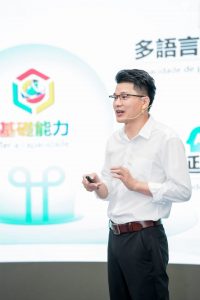
Lin Yuchu
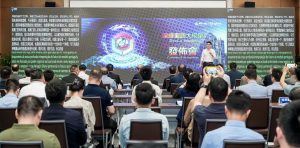
DeeCo-Model was launched in May in the Guangdong-Macao In-Depth Cooperation Zone in Hengqin
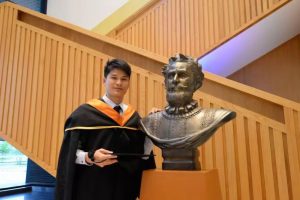
Lin Yuchu attends the congregation at the University Hall

Lin Yuchu celebrates graduation by throwing his cap into the air with his classmates
數據要素產業創新大會上發表演說-300x200.jpg)
Lin Yuchu gives a speech at the China (Shenzhen) Data Industry Innovation Conference
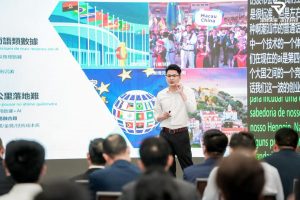
Lin Yuchu’s team targets the Portuguese-speaking and minority language markets in the Belt and Road Initiative
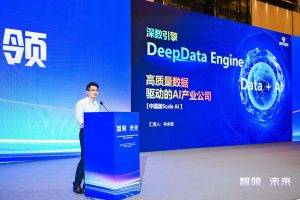
Lin Yuchu leads his team in developing the ‘DeepData Engine’ service platform

